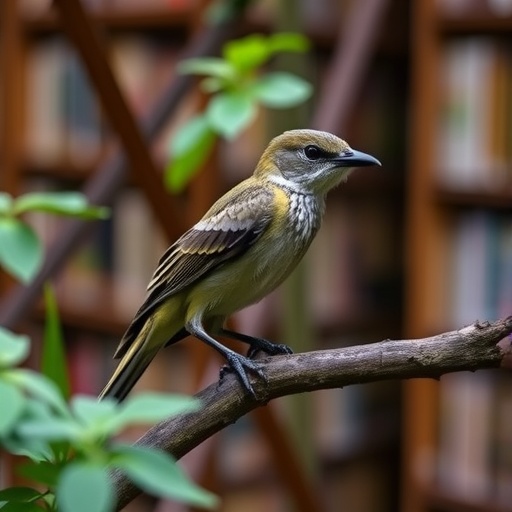Abu Dhabi, United Arab Emirates, 15 October 2025 (IUCN) – In a major leap forward for the accessibility of conservation science, the International Union for Conservation of Nature (IUCN) has announced that over 1,500 of its historical publications are now freely available online. This significant milestone comes at the conclusion of a comprehensive three-year project funded by the Arcadia Fund, a family philanthropy dedicated to preserving cultural heritage and promoting open access to knowledge. The initiative has not only digitised a vast archive of conservation literature but has also culminated in the development and adoption of IUCN’s Open Access Policy, effectively redefining how conservation information is disseminated to researchers, policymakers, and the public.
The digitisation process involved the meticulous scanning and conversion of more than 115,000 pages spanning 1,540 unique titles from IUCN’s historical editions. Notably, this includes all editions of the magazine Species and the IUCN Members’ magazine dating back to 1948, providing an unprecedented window into decades of biodiversity research and conservation practice. Prior to this effort, much of this content was accessible only in physical archives or limited library collections, restricting the flow of knowledge needed for timely environmental decision-making and scientific advancement.
This transformation in information availability is a linchpin in IUCN’s strategy to promote open science principles within the global conservation community. According to Dr. Jon Paul Rodriguez, Chair of the IUCN Species Survival Commission, “The digitisation of thousands of pages of historical documents has transformed our access to knowledge about our past, ensuring that decades of learning, growth and transformation are perpetually stored in the IUCN Library and made easily available to the Union and beyond.” This statement highlights the project’s role in bridging historical insights with contemporary conservation challenges.
Central to the project’s impact has been the comprehensive upgrade of the IUCN Library System’s digital infrastructure. The enhanced interface now offers advanced search functionality, allowing users to filter publications by criteria such as online or physical availability, specific IUCN subcollections, and publishing entities. This sophisticated system streamlines research workflows, facilitates interdisciplinary studies, and fosters a more integrated understanding of conservation science by connecting historical and current data sources.
Equally crucial is the establishment of the IUCN Open Access Policy for Publications, formally approved by the IUCN Executive Board in October 2024. This policy mandates that all new IUCN publications released under the Union’s copyright adopt Creative Commons licenses, specifically CC-BY-NC, to maximize accessibility while protecting author rights. One of the pioneering outputs under this new license is the report titled Enhancing climate change mitigation in protected areas, reflecting IUCN’s commitment to producing high-quality, openly available scientific content that can inform global policy and environmental management practices.
Beyond digitisation and policy development, the Arcadia grant facilitated extensive capacity-building within IUCN’s scholarly network. Over the grant period, IUCN conducted 20 dedicated sessions on open access and scholarly communication, engaging 832 conservation professionals through webinars, hybrid panels, and workshops. These events not only disseminated knowledge about open access publishing but also fostered a collaborative culture around scientific integrity and transparency—key pillars in confronting the biodiversity extinction crisis.
The project’s support extended to IUCN’s peer-reviewed journals, successfully elevating their standards to meet the rigorous criteria of the Directory of Open Access Journals (DOAJ). Titles such as PARKS, Gajah, and Edentata (now rechristened Xenarthra) have been included, representing a broad spectrum of conservation topics from protected area governance to species-specific research. This inclusion ensures that valuable research is discoverable and citable within an open-access framework, further amplifying the reach and impact of conservation science.
The digitisation of archival content also serves an essential scholarly function by preserving the historical context of species assessments, ecosystem management strategies, and environmental policy evolution. Researchers and practitioners can now contextualize contemporary conservation efforts within a continuum of scientific inquiry, improving the design of future interventions. This linkage between past and present knowledge enhances adaptive management strategies crucial for mitigating the accelerating threats of habitat loss and climate change.
Importantly, the project emphasizes the role of technology in democratizing conservation data. By removing paywalls and physical access barriers, the initiative empowers a more diverse range of stakeholders, including scientists from under-resourced regions, indigenous communities, educators, and citizen scientists. This broader participation catalyzes innovation, community engagement, and informed environmental stewardship at multiple governance levels.
Arcadia’s investment, exceeding $1.3 billion in global initiatives since 2002, reflects a visionary commitment to open knowledge and cultural preservation. Their funding of the IUCN digitisation and open access effort exemplifies how philanthropic resources can accelerate scientific advancement by transforming information infrastructures. The collaboration between Arcadia and IUCN underscores the critical synergy between philanthropic support and institutional commitment in addressing the urgent challenges facing biodiversity conservation.
Looking forward, IUCN aims to build on this foundation by continuously expanding its open access offerings and refining its digital platforms. The institution recognizes that sustaining scientific integrity and enhancing the impact of nature conservation necessitate persistent adaptation to emerging technologies and evolving scholarly norms. The ongoing transformation in access to conservation literature is thus positioned as both a tactical and strategic pillar in safeguarding global biodiversity for generations to come.
In summary, this landmark project marks a pivotal moment in conservation science communication. By unlocking more than half a century of accumulated knowledge through digitisation and institutional reform, IUCN sets a new standard for transparency, accessibility, and collaboration. The enhanced IUCN Library System, bolstered by the Open Access Policy and enriched scholarly discourse, will indelibly strengthen the evidence base informing conservation policy and action worldwide.
Subject of Research:
Digitisation and open access of historical conservation publications; scholarly communication in conservation science
Article Title:
IUCN Unlocks Over 1,500 Historic Conservation Publications Online Through Arcadia-Funded Digitisation Effort
News Publication Date:
15 October 2025
Web References:
https://portals.iucn.org/library/lists/general/all/all/all/view
https://doi.org/10.2305/FZGY2419
https://parksjournal.com/
https://www.asesg.org/gajah.php
https://xenarthrans.org/journal/
https://vimeo.com/user72798802
https://arcadiafund.org.uk/
Keywords:
Open access, Conservation science, Digitisation, Scholarly communication, Biodiversity knowledge, IUCN Library, Arcadia Fund, Scientific publishing, Research accessibility, Policy development, Protected areas, Climate change mitigation




